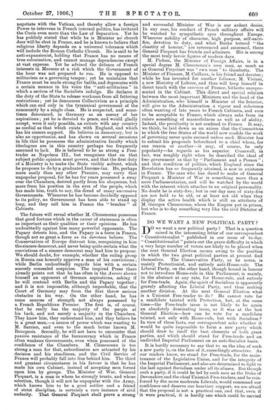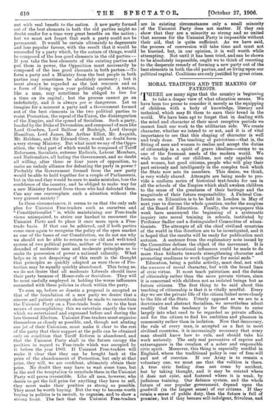DO WE WANT A NEW POLITICAL PARTY P D O we
want a new political party ? That is a question raised in the interesting letter of our correspondent " Constitutionalist " published in our issue of to-day. " Constitutionalist " points out the grave difficulty in which a very large number of voters are likely to be placed when the next General Election occurs owing to the position in which the two great political parties at present find themselves. The Conservative Party, as he notes, is mainly Protectionist, and entirely anti-Home-rule. The Liberal Party, on the other hand, though bound in honour not to introduce Home-rule in this Parliament, is in the abstract at any rate, for Home-rule, and entirely for Free-trade. Again, the spirit of Socialism is apparently gravely affecting the Liberal Party, and thus making another division. At the next General Election what is a Unionist Free-trader to do ? He cannot vote for a candidate tainted with Protection, but, at the same time—the Free-trade issue is not likely to be again an absolutely dominating issue, as it was at the last General Election—how can he vote for a candidate tainted, not only with Home-rule, but with Socialism ? In view of these facts, our correspondent asks whether it would be quite impossible to form a new party which should draw to itself the best elements of both great parties, and which should stand for Free-trade and an undivided Imperial Parliament on an anti-Socialist basis.
It is hardly necessary to say that to us the idea of such a new party is, on the face of it, exceedingly attractive. As our readers know, we stand for Free-trade, for the main- tenance of the Legislative Union, and for the integrity of the Imperial Parliament, and also are determined to fight to the last against Socialism under all its aliases. But though such a party, if it could be led by such men as the Duke of Devonshire and the chief Unionist Free-traders, and be rein- forced by the more moderate Liberals, would command our confidence and deserve our heartiest support, we are afraid that the proposal is not a practical one, and that, even if it were practical, it is hardly one which could be carried out with real benefit to the nation. A new party formed out of the best elements in both the old parties might no doubt confer for a time very great benefits on the nation ; but we must not forget that such a party could not be permanent. It would be certain ultimately to degenerate and lose popular favour, with the result that it would be succeeded by a party which, by the nature of things, would be composed of the less good elements in the old parties.— If you take the best elements of the existing parties and put them in power, the Opposition must necessarily be composed of the less good elements in both parties.—To form a party and a Ministry from the best people in both parties may sometimes be absolutely necessary ; but it must always be regarded as the last resource and as a form of living upon your political capital. A nation, like a man, may sometimes be obliged to live for a time on its capital ; but the process cannot go on indefinitely, and it is always per se dangerous. Let us imagine for a moment a party and a Government formed out of the best elements in the two political parties to resist Protection, the repeal of the Union, the disintegration of the Empire, and the spread of Socialism. Such a party, headed by the Duke of Devonshire, and composed of men like Lord Goschen, Lord Balfour of Burleigh, Lord George Hamilton, Lord James, Mr. Arthur Elliot, Mr. Asquith, Mr. Haldane, and Sir Edward Grey, would no doubt form a very strong Ministry. But what must we say of the Oppo- sition, the vital part of which would be composed of Tariff Reformers, Socialists, extreme Radicals, Labour Members, and Nationalists, all hating the Government, and no doubt all willing, after three or four years of opposition, to make an unholy alliance for defeating the party in power ? Probably the Government formed from the new party would be able to hold together for a couple of Parliaments, but in the end they would be sure to make mistakes, lose the confidence of the country, and be obliged to make way for a new Ministry formed from those who had defeated them. Can any one contemplate such a situation without the very gravest anxiety ?
In these circumstances, it seems to us that the only safe plan for Unionist Free-traders such as ourselves and " Constitutionalist " is, while maintaining our Free-trade views unimpaired, to strive our hardest to reconvert the Unionist Party and to place it once more upon a Free- trade basis. If that can be achieved, and if both parties come once again to recognise the policy of the open market as one of the bases of our Constitution, we do not see why we should not be able to return to our old and well-tried system of two political parties, neither of them so entirely denuded of moderate men and moderate principles as to make its possession of power a national calamity. What helps us in not despairing of this result is the thought that principles so quickly adopted as were those of Pro- tection may be equally quickly abandoned. This being so, we do not desire that all moderate Liberals should leave their party because of Home-rule or Socialism. They will be most usefully employed in holding the worse influences connected with these policies in check within the party.
To sum up, before so drastic a proposal is accepted as that of the foundation of a new party we desire that a sincere and patient attempt should be made to reconstitute the Unionist Party on a Free-trade basis. As to the best means of accomplishing this we entertain exactly the view which we entertained and expressed before and during the late General Election. Unionist Free-traders must organise themselves as closely as possible, and, though not abating one jot of their Unionism, must make it clear to the rest of the party that their support at the polls can be obtained only on condition that Tariff Reform is abandoned, and that the Unionist Party shall in the future occupy the position in regard to Free-trade which was occupied by it before the year 1903. If Unionist Free-traders will make it clear that they can be bought back at the price of the abandonment of Protection, but only at that price, they will, we are confident, ultimately obtain their price. No doubt they may have to wait some time, but in the end the temptation to reinclude them in the Unionist Party will prove irresistible. Like all men, however, who desire to get the full price for anything they have to sell, they must make their position as strong as possible. They must be worth buying. But the way to become worth buying in politics is to recruit, to organise, and to show a strong front. The fact that the Unionist Free-traders are in existing circumstances only a small minority of the Unionist Party does not matter. If they can show that they are a minority so strong and so united that success for the Unionist Party is impossible without their aid, that is quite sufficient. As we have said, the process of conversion will take time and must not be hurried, but, in our opinion, it is well worth while attempting. Not until it has been tried, and can be shown to be absolutely impossible, ought we to think of resorting to the desperate remedy of forming a new party out of the best elements in both the old parties, and so living upon our political capital. Coalitions are only justified by great crises.















































 Previous page
Previous page